Lockheed's War, or Dreaming of Byzantium
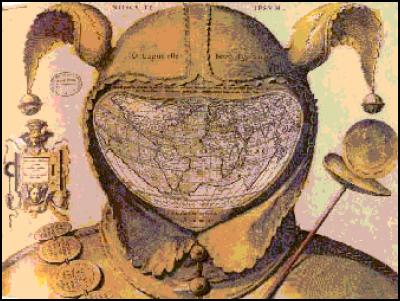
Sanders Research Associates
SRA Commentary:
Lockheed's
War, or Dreaming of Byzantium
Chris Sanders
March
31, 2003
“Both in political and economic issues the 'powerful' had won all along the line. From Romanus I to Basil I the central authority had tried to erect a barrier against the great magnates' urge to acquire land, and this had now broken down. The free smallholdings disappeared without a protest, and the wealthy landlords absorbed the property of peasant and soldier, turning the former owners into dependents. Thus the very foundations on which Byzantium had built since its revival in the seventh century were swept away, with the result that the strength of the armed forces and of revenue declined, and the consequent impoverishment weakened the military power of the state still further.”- George Ostrogorsky, History of the Byzantine State, Basil Blackwell, 1980, p. 323
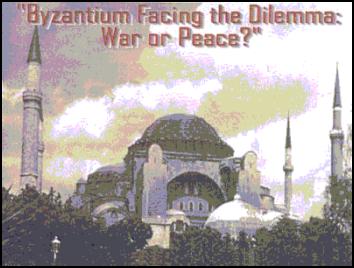
Work is freedom, war is peace, might makes right, crime is law
Ostrogorsky' history of Byzantium was written 50 years ago, not long after the US National Security Act of 1947 which, among other things, established the Central Intelligence Agency, renamed the War Department the Department of Defense, and raised the banner of the Red Scare, demanding loyalty oaths from all government employees. It is tempting to suppose that Ostrogorsky might have had some of this in mind when he wrote his book. With the benefit of a half century of hindsight, it seems that the Act of 1947 is as good a place as any to peg the apogee of the American Empire.
1947 is a good choice for several reasons. First, we now know thanks to the miracle of time and declassified documents that the Soviet Union was never the threat that it was made out to be. Having lost some 30 million dead in the Second World War, it was in no condition to take on the United States, which lost around 250 thousand dead, owned most of the world's gold, had the only intact industrial base, and possessed undisputed control of the sea. America also, by all accounts, enjoyed unprecedented prestige and goodwill around the world.
Second, with the 1947 Act, the US government established an organ of government, the CIA, modelled as Dean Acheson put it on the Soviet NKVD. The CIA's charter is noteworthy primarily for making it legal to break the law. If this seems odd, establishing by law a department to break the law, it was at least consistent with other behaviour, such as renaming the War Department the Department of Defense. This manipulation of language was a portent of a willingness to corrupt other aspects of the body politic.
Eternal politics
A theme running through Ostrogorsky's book is the connection between the ownership of productive capital (i.e. land) state finance, military preparedness, and the overall health and security of the political economy. The point, obviously, of the above quote is to draw attention to the interesting and manifest similarities between the evolution of the Byzantine state and its contemporary American equivalent. For "great magnates" substitute members of the Boards of Directors of the Fortune 500, and for central authority, substitute constitutional government.
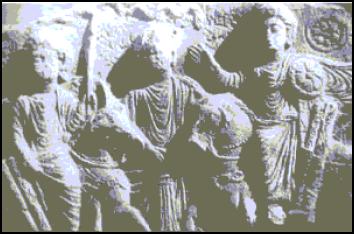
In accumulating the preponderance of productive capital to themselves, the magnates of Byzantium destroyed the financial and moral foundations of the state, and consequently deprived it of the means to perform its most basic function, which was to provide security. A result was an institutionalisation of inflation, as the government debased the coinage systematically to increase its seigniorage profits. Another was the increased dependence of the central authority on tax farming by those same magnates. These measures led to the economic and political collapse of the small independent landowners who had formed the backbone of the army and the bedrock of the state's fiscal position. As the state came to rely more and more on others to collect its taxes, it also came to rely more and more on mercenaries to do its fighting. Ultimately it lost what could be called its foundational rationale; or in a word, its legitimacy. This was fatal. When the Arabs conquered Syria and Egypt in the 7th century, they defeated the world's greatest military power, fresh from its victory over the Persian Empire. They were welcomed by the unarmed, predominately Greek population of those two richest Byzantine provinces because they scrapped the empire's punitive tax system.
Today's magnates in the board rooms of Lockheed, Dyncorp, GE, and the rest are squeezing every bit as hard as their Byzantine predecessors. And as the American state comes to rely more and more on mercenaries such as MPRI http://www.mpri.com/, Dyncorp http://www.dyncorp.com/index.htm , and a host of others to fight its wars, the interests of the armed forces and the citizens of the nation are diverging, just as they did in Byzantium.
The wrong war at the wrong time in the wrong place
Richard Perle recently boasted that 40 thousand men could take Baghdad. In response to the incredulous, he opined that this was a political decision too important to be left to the generals. Perle has now resigned from his position at the Defense Policy Board, modestly saying that he didn't want his problems, such as his conflicts of interest with Global Crossing and other companies, to divert Secretary Rumsfeld's attention from his increasingly realistic war. Perle has been as responsible as any for the mess that the United States now finds itself in. At least, however, now that war has begun, some things are clear. We know now that Iraq is going to fight. More than a week on (as of this writing on March 28) no organised formation of the Iraqi Army has surrendered, and even irregular formations are offering effective resistance. We know, too, that the coalition has not been welcomed, either by the Shia in the south or even the Kurds in the north. This should not come as a surprise, given the betrayal of both by the father of the American president only 12 years ago. Both of these developments mean that whatever time-frame seemed reasonable for "victory" in this lamentable war, that time scale has now been extended.
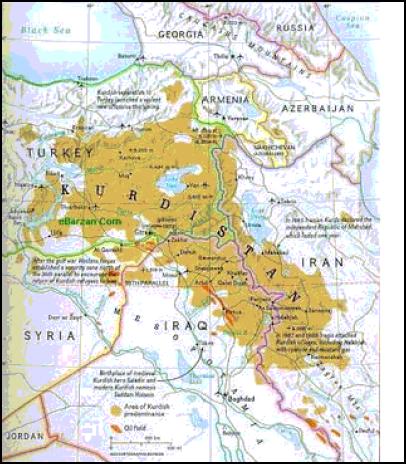
Turkey has not only defied the US by refusing it a platform from which to launch its invasion of Kurdistan, but has crossed the Iraqi border itself. Even if, which we think doubtful, that the Turks remain within their self-declared "neutral zone," this considerably complicates the coalition's position in the north. In addition, the Kurds have made clear their determination to administer the northern oil fields, which is tantamount to declaring a northern Kurdish state. This is inconsistent with and antithetical to the coalition's stated aim of preserving the Iraqi state, never mind instituting a "democracy." In a word, the north has, within the first week of action, already degenerated into a three-way contest for control, or possibly a four-way contest if Iran also intervenes. It is important to recognise that in this sense, the war has already widened.
In the south, the coalition has bypassed urban areas to race north to Baghdad, thus exposing its flanks to attack and leaving behind bases for irregular resistance. It may work in the end, thanks to the well-established difficulty that modern Arab armies find in organising and executing offensive mechanised warfare. However, whatever the opinions loudly expressed by Washington and London, time is not on the coalition's side. There are three clocks ticking.
First is the advent of summer temperatures, which by the end of April will have begun and which will complicate coalition operations. The second is the coalition's equipment. American and British tanks and helicopters were designed for operations against Soviet forces in northern European. They were not designed for combat in the heat and dust of Mesopotamia. Ground operations during Operations Desert Storm 12 years ago lasted six days. By that time American tanks were already breaking down. There is little reason to think that this problem has been solved. Coalition dependence on electronics may also prove (and in at least a few reported instances, is proving) to be a weakness. The M1 tank is a marvel, but its superior firepower means little if it cannot move and it cannot use its targeting and positioning computers.
It is the third clock, however, which is ticking loudest. It is the money clock.
The Empire mobilises its vassals to pay for war
The US is expending its so-called smart weapons rapidly. One report - http://www.aeronautics.ru/news/news002/news078.htm - last week estimated that in the first week of fighting the coalition had expended fully one third of its cruise missiles. President Bush has asked Congress for nearly $80 billion in a supplemental appropriation to pay for the war. Estimates of the cost of an occupation are running as high as $30 billion per year, but of course one has to win first and winning looks as though it will take longer than originally estimated.


Spot the banker
In the "buy now pay later" school of economics taught at Harvard and practiced in Washington, this may not seem to be much of a problem. So far it hasn't been, since the problem has been largely shifted all the way across the Pacific to Tokyo, where America's clients, the Japanese Liberal Democratic Party, are leaving no stone unturned in the effort to find more cash for Uncle Sam. In doing this, the Japanese are experimenting with what we might call "Star Trek Central Banking" which is going where no central banker has gone before. In his last two public appearances in March before he resigned his post, Bank of Japan Chairman Masaru Hayami warned about the loss of control over the BOJ's balance sheet. This has inflated to more than a quarter of Japan's GDP as it acquires ever more dollars and monetises ever more government bonds and increasingly, the equity of private sector companies. To support the dollar (which in true NSA '47 style is called letting the markets determine exchange rate levels) the BOJ has now accumulated more than $500 billion in reserves, or some half its assets, and has pushed what it calls "current account balances" to more than Y25 trillion. These are free reserves of the banking system, or what economists call high powered money. The truth is that the BOJ is completely (I use the word carefully) out of control.
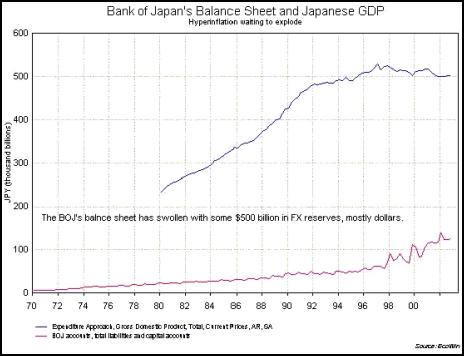
Hayami is a decent man, as undoubtedly is his successor, Toshihiko Fukui. Left to their own devices, neither would likely execute this irresponsible and reckless monetary policy. The reason is that they understand, as at least Hayami has made clear from his public statements over the years, that power of the money monopoly granted central bankers is only justifiable under circumstances in which those central bankers are independent and really free of political pressure. This, of course, is the essential myth of central banking, an ironically Babylonian construct in which the guardians of the temple collection plate are trusted by the congregation not to rob it.
What this means in terms that any good Latin American or German of a certain vintage can understand is that the seeds of hyperinflation in the dollar economy are being sown in Tokyo and Washington. The latter now absorbs 80% of world savings, and to judge from the pathetic budget spectacle in the American Congress, is set take it all.
Last week, American spokesmen announced the novel idea that the rest of the world should pay for the reconstruction of Iraq. This undoubtedly sounds reasonable inside the Washington beltway, where, as we noted at the beginning of this essay, language long since severed its connection with reality. Outside the beltway, we doubt that it will play in Peking, or for that matter, in Moscow, Berlin, or Paris. Having bombed Iraq for a decade, and now having invaded it, it is the height of absurdity to think that others will willingly pick up the pieces. In the quaint argot of Bush's Texas, "that dog won't hunt."
The US, as of this writing, is sending another 30,000 troops to Iraq to join the fray with the announced intention of dispatching more to double the initial invasion force by the end of April. Some officers are now talking about a war lasting months. If this war does last months, the US financial position as currently structured will simply be untenable. President Bush's recently requested supplemental budget of $76 billion is intended to finance weeks of fighting, not months or years. At this sort of rate it is necessary to begin thinking about hitherto unthinkable levels of debt. The financial markets are not discounting this. Nor do they appear to be discounting the reality that the US depends for its finance not only on Japan, but also on Greater China. China opposes the war. If the war lasts months, we are not far away from capital controls. Instead of the economic recovery that Messrs. Bush and Snow say is at the top of their priority list, the US may well find itself staring into the abyss of depression.
To have passed from its victory in the Cold War to this sort of pass in scarcely more than a decade is quite an achievement, the more so because so many Americans seem oblivious to the danger that the country faces. The ruinous cost of the military is simply ignored. The debt mountain on which money GDP is built is within sight of even its theoretical limits. The US now absorbs 80% of the world's savings. When the US pre-empts it all, what else can it do? Debate in the Senate over the budget has an air of unreality about it. How big will the tax cut be? How much shall we increase spending? Absent the deliberations in Congress are hard questions about the way the money authorised for war is spent. Absent is any debate about the reasons for war. Absent is any challenge to the growth of the military budget or the militarisation of domestic law enforcement.
On August 20 636 AD, A Byzantine Army under the command of Theodorus, brother of the emperor Heraclius, met an Arab army half its size on the banks of the Yarmuk River a tributary of the Jordan east of the Sea of Galilee. It was slaughtered, Theodorus killed, and Syria lost forever to the Byzantines.
But that doesn't have anything to do with us, does it?

ENDS


 Martin LeFevre - Meditations: Psychedelics, Mystical Experiencing, And Organized Religion
Martin LeFevre - Meditations: Psychedelics, Mystical Experiencing, And Organized Religion Keith Rankin: Equity Rights - UBI, SUI, BUI, HUI, Or GUI?
Keith Rankin: Equity Rights - UBI, SUI, BUI, HUI, Or GUI? Binoy Kampmark: The Inevitable Souring - Elon Musk Falls Out With Donald Trump
Binoy Kampmark: The Inevitable Souring - Elon Musk Falls Out With Donald Trump Ian Powell: Postscript On Ethnic Cleansing, Genocide And New Zealand Recognition Of Palestine
Ian Powell: Postscript On Ethnic Cleansing, Genocide And New Zealand Recognition Of Palestine Gordon Campbell: On Why Leakers Are Essential To The Public Good
Gordon Campbell: On Why Leakers Are Essential To The Public Good Ramzy Baroud: Global Backlash - How The World Could Shift Israel's Gaza Strategy
Ramzy Baroud: Global Backlash - How The World Could Shift Israel's Gaza Strategy